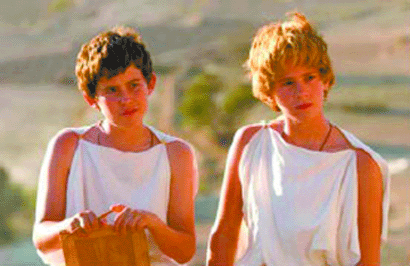Hollywood bravely chronicles the fullness of Alexander the Great’s life
Wracked by the cares of monarchy and waging endless wars, Alexander (Colin Farrell) enters his bedchamber to retire for the evening. He drops his robe (briefly revealing the Farrell package we were denied seeing in “A Home at the End of the World”) and slides into bed. As the lights dim, he casts a glance at his ever-present, ever-silent half-naked manservant and beckons him over.
That this is a mega-budgeted, hokey, violent and overlong, at nearly three hours, Hollywood epic should come as a surprise to no one. That it is the most homoerotic studio-produced epic ever made, however, is definitely worthy of note. Things get gay very early on, with Alexander’s childhood teacher, no less than Aristotle (Christopher Plummer), extolling the love between men to an attentive class of mini-skirted boys. The philosopher does make sure, however, to denigrate mere physical lust, preferring a more high-minded, spiritual/intellectual male exchange. (Plummer is certainly preferable to Anthony Hopkins, who plays Ptolemy, narrator of the film, in a patented old-codgery way to make you want to strangle him.)
There follow scenes of the boys in scantily-clad wrestling class entwining under the fond tutelage of Brian Blessed’s instructor, and the evocation of traditionally accepted Greek man-boy love here is unavoidable. (No wonder Jack Valenti has—finally!—stepped down as President of the Motion Picture of America Association. What’s Greek for “hooray”?)
For those disappointed by “Troy’s” omission of the deep love felt by Achilles for his Patroclus, Oliver Stone redresses this by having Alexander constantly refer to their exalted relationship, especially as it parallels his own to childhood friend Hephaistion, Jared Leto, looking like the most luscious California surfer boy of all time. They exchange many a deeply fond look and embrace throughout the film, and, indeed, emerge as its real love team, but Stone hedges a bit over the physicality of their relationship.
Perhaps taking a cue from old Aristotle, the two men behave like the noblest, most sexless Hays Code Hollywood couple ever, a Greer Garson and Walter Pidgeon for their time.
“On the eve of battle, it’s best to remain alone,” Alexander tells the eternally understanding Hephaistion.
This royal affair has his entire court and army chattering, but Alexander resolutely goes his own way. When he does decide to marry a woman, to everyone’s approval, he consoles Hephaistion with the notion that he, too, will marry, and their children will play and grow old together.
The lady Alexander chooses is Roxane (Rosario Dawson), a princess, who ignores the advice Sting offers in song and definitely puts on the red light for him. Indeed, she rather conforms to antquity’s ubiquitously misogynistic view of women—all naked, snarling lust at the outset, and then ensuing royal listlessness—as does Olympias (Angelina Jolie), Alexander’s sociopathic mother. Stone seems to have confused Olympias with Medusa, for she is constantly behaving like and surrounded by uncoiling snakes, and Jolie plays her as if trying to outdo the guttural excesses of such fabulously hammy Greek film actresses Katina Paxinou, Melina Mercouri and Irene Pappas. Jolie’s attempt at a Greek accent constitutes the only such effort in the film, which is risibly littered, instead, with Irish brogues, perhaps in tribute to Farrell.
Stone pulls out all the technical stops in the battle scenes—slo-mo, strobes, stop action, flash editing. They’re brutal and bloody, all right, but entirely chaotic; what is crucially missing is a real expositional thrust, which would give them some essential dramatic logic and truly engage the audience. It’s the kind of thing John Ford, Akira Kurosawa, King Vidor and Orson Welles were so adept at; in Stone’s hands the battles become so many football plays, with Farrell coaching his soldiers in anachronistically modern terms (“Ride, Greeks, ride!”). The warfare becomes increasingly pointless, as well, as Alexander’s dream of world domination comes off as merely so much megalomania, despite his expressed dream of world peace, albeit under his rule. He eternally marches his armies into unsuspecting countries, convinced of their need for his changes, until he meets his match in India, and an hysterically overblown final combat scene with elephants.
The blondined Farrell, to his credit, emerges from all of this with dignity and true star quality intact. While he may not quite achieve the Olympian beauty of Brad Pitt as Achilles in “Troy,” unlike him, he never sounds like a pipsqueak Tom Sawyer in the heat of war. Farrell admirably doesn’t flinch one iota from the homosexuality as, say, fellow divo Liam Neeson did, onstage as Oscar Wilde, when he noticeably flinched during the kissing scenes with Bosie. When his manservant performs a trés gay dance number for him in one of the infinite banquet scenes, Alexander’s soldiers cheer him on to bestow a grateful smooch upon the performer. The actor has no problem complying, and this, coupled with his appearance in “A Home At the End of the World” earlier this year, make Colin Farrell 2004’s Honorary Gay Straight Man of the Year.
Somewhere, Mary Renault must be smiling.


































